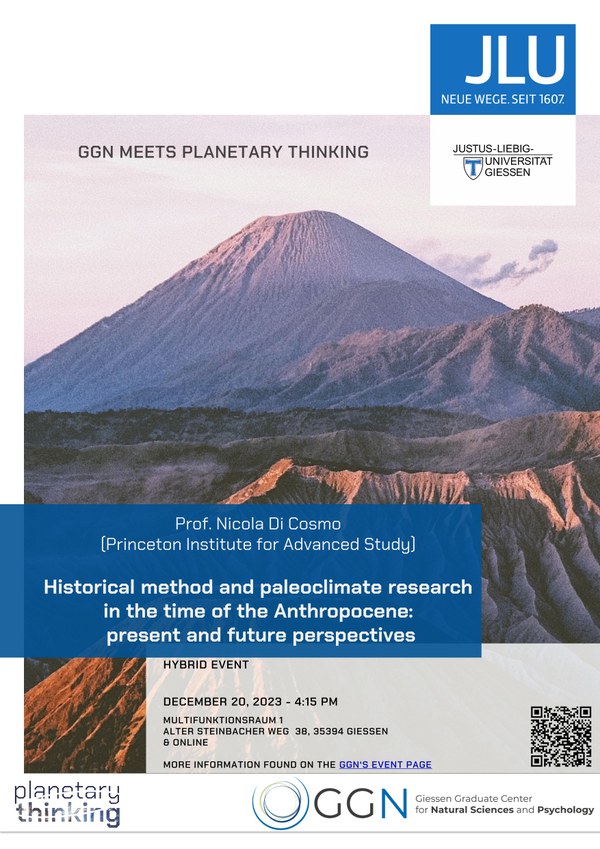Lecture on Historical Paleoclimatology
December 20, 2023 - "Historical method and paleoclimate research in the time of the Anthropocene: present and future perspectives" (Hybrid event)
in cooperation with Giessen Graduate Center for Natural Sciences and Psychology (GGN)
| Time | Place | Participation |
|---|---|---|
| 4:15 pm |
Multifunktionsraum 1, Alter Steinbacher Weg 38, 35390 Gießen & Online |
online registration with stud.ip & through mail to panel |
Lecture
|
Prof. Dr. Nicola Di Cosmo (Princeton Institute for Advanced Study) |
Over the past two decades historians have searched paleoclimate data to find answers to long-standing questions about social and political phenomena. Collaborations between historians and scientists have proliferated and synergies have led to extensive efforts to find ways to link natural archives and climatological science to human dynamics in the premodern world. Experimental research in this field can contribute to a better understanding of the human past, but also to an understanding of how societies respond, overcome, or succumb to environmental changes and climate-induced crises. In the age of the Anthropocene, when humanity is unevenly but collectively called to confront the realities of climate change and global warming, a reflection on past experiences, embracing multiple societies, technologies, economies and stages of development and complexity, can be an invaluable resource to reflect on current challenges, and possibly avoid common fallacies, such as mechanical or simplistic causal connections between climate impacts and social responses. Relatively isolated but growing synergies between scientific and humanistic researchers have produced significant results, but have also led to questioning methodologies, theoretical assumptions, and the general goals of a climatic approach to historical research. This lecture will illustrate some of the main questions confronting scientists and historians that have engaged in interdisciplinary projects, focusing in particular on how such “hybrid” research may contribute to larger conversations about climate and society. |
 |
Prof. Dr. Nicola Di Cosmo
|
Nicola Di Cosmo is the Henry Luce Foundation Professor of East Asian Studies at the Institute for Advanced Study, School of Historical Studies (Princeton, USA). He holds a PhD from Indiana University, and a BA from the University of Venice (Italy). He is also Visiting Professor of East Asian Studies at Princeton University. His main research interests are in the history of Chinese and Inner Asian frontiers from the ancient to the modern periods, history of nomadic peoples, and history of the Qin dynasty. His books include Ancient China and Its Enemies: The Rise of Nomadic Power in east Asian History (Cambridge), Manchu-Mongol Relations on the Eve of the Qing Conquest (Brill), The Diary of a Manchu Soldier in Seventeenth Century China (Routledge) and several edited and co-edited books: Military Culture in Imperial China (Harvard), The Cambridge History of Inner Asia (Cambridge), Warfare in Inner Asian History (Brill), Empires and exchanges in Eurasian Late Antiquity. Rome, China, Iran, and the Steppe, ca. 250–750, Rebel Economies: Warlords, Insurgents, Humanitarians, etc. He has previously taught at Harvard University and at the University of Canterbury (New Zealand) and has been a visiting professor, among others, at New York University-Shanghai, University of Venice (Italy), Columbia University. He has been the recipient of a research fellowship at Cambridge University, and his work has been founded by the Chiang Ching-kuo Foundation, the Rockefeller Foundation, the National Science Foundation and other entities. His most recent research work concerns the use of paleoscientific data in historical research, with special reference to the history of China, Central Asia, and Mongolia, especially seeking to integrate long and short-term high-resolution paleoclimatic data with historical analysis. |
